Different Treatment of Rohingya Refugees in Thailand, Malaysia and Indonesia
Rohingya refugees in Thailand, Malaysia, and the Philippines are treated differently than those in Indonesia.
maaf email atau password anda salah
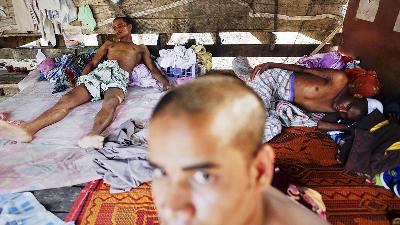
Rohingya refugees in Thailand, Malaysia, and the Philippines are treated differently than those in Indonesia.
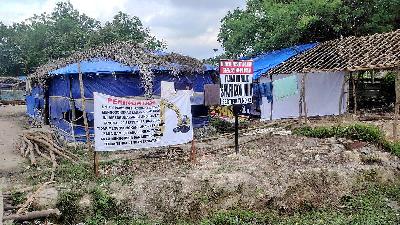
The Rohingya refugees living in Pekanbaru have more freedom to move around and reside in lodgings. Their children can also attend school.

The increasingly overcrowded refugee camps demand improvements in the mechanisms for handling Rohingya refugees. The number of refugees continues to rise.

Several Rohingya refugees successfully built their careers in various fields. They continued to work and raised awareness about the plight of displaced Rohingya refugees.

Rohingya refugees are still living in several inadequate temporary shelters in Aceh.
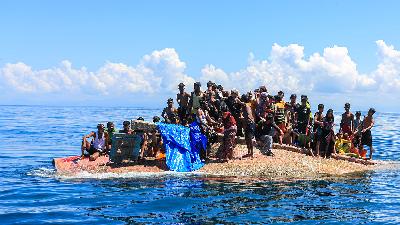
Uncertain future looms over Rohingya refugees in Indonesia. They are also struggling with various limitations.
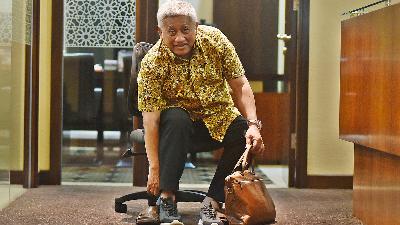
Mohammad Nuh, chairman of the Forum for Boards of Trustees of Legal Entity State Universities, explains the polemic over the single tuition fee (UKT).

Reports on the finding of human bones in Rumoh Geudong, Aceh, the return of the term OPM for armed criminal group in Papua, and the imprisonment sentence received by an environmental activist in Central Java.

The human remains at Rumoh Geudong are strong evidence of human rights violations. The government has an obligation to uncover the truth and bring justice.

Moh. Wijdan, Head of Ketapang Jaya village, Ketapang, Sampang, East Java, replies to Pressure from the Police and Prosecutors article.

Rohingya refugees risk their lives to reach Aceh. They are rejected by society and their fate is unclear.
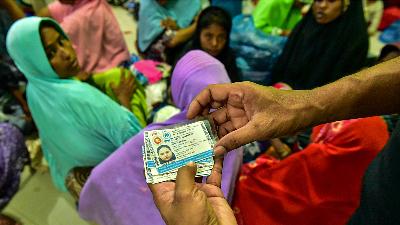
Rohingya refugees have fled to many countries. They live as castaways with no certainty about their future.

For the sake of humanity, the Indonesian government must not be hypocritical or wash its hands of the Rohingya refugees.
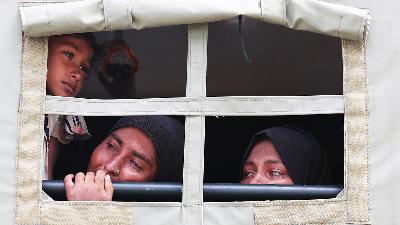
After being expelled from Myanmar, Rohingya refugees are also rejected in Aceh. UNHCR’s social media accounts are flooded with hate speech.
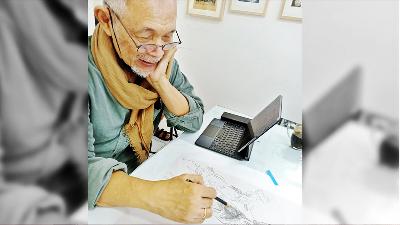
In the solo exhibition of Goenawan Mohamad, the drawings are honest and free. GM presents many solitary objects.
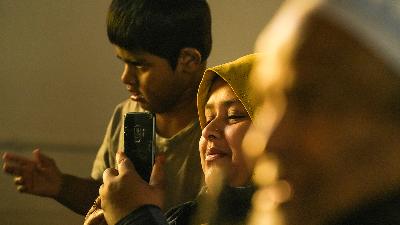
Rohingya refugees are facing health and educational problems. ASEAN is expected to handle the refugees and military junta.
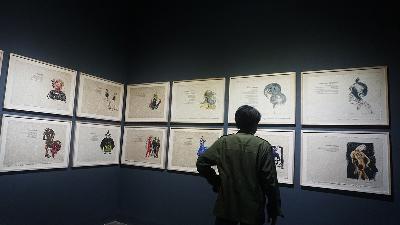
Goenawan Mohamad exhibits works depicting ghosts he encountered in a collective exhibition in Art Jog 2023.
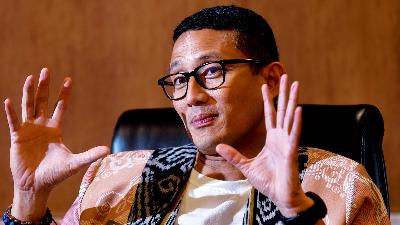
Sandiaga Uno talks about his chance of being nominated as a vice-presidential candidate to Ganjar Pranowo and a possible face-off with Erick Thohir.

Goenawan Mohamad’s gracious farewell from Sidelines.

New Capsules ranging from Erick Thohir’s rise as PSSI General Chairman to the haj pilgrimage cost increase.

Local alcoholic beverages in a number of regions have strong traditional roots. Brewers are starting to sell them in attractive packaging.
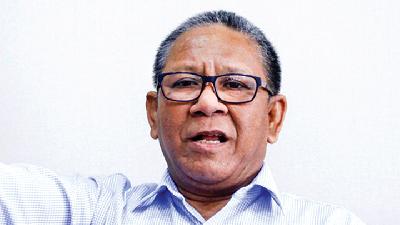
Mohammad Rohanudin, CEO of Radio Republik Indonesia (RRI), had fought to keep a 142.5- hectares land that was going to be taken away to be used as the location for the Indonesian International Islamic University (UIII).
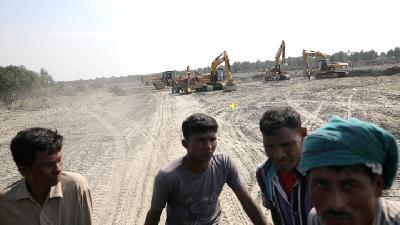
The Bangladeshi government is unable to convince Rohingya refugees to move to Bashan Char Island. There are concerns over safety and economic sustainability.

Rising number of Covid-19 patients reminds Mohammad Syahril of the time the pandemic began to unfold last January. He had just been appointed the chief executive officer of the Sulianti Saroso Infectious Diseases Hospital (RSPI) that time.
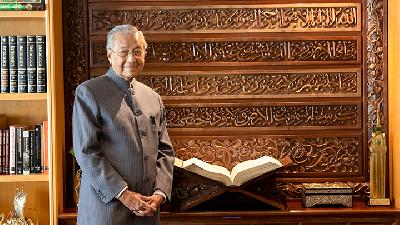
Mahatir Mohamad was to relinquish his position as Malaysia’s prime minister after the Asia-Pacific Economic Cooperation (APEC) forum scheduled to be held this November in Kuala Lumpur, paving the way for People’s Justice Party (PKR) President Anwar Ibrahim to fill the country’s top position.
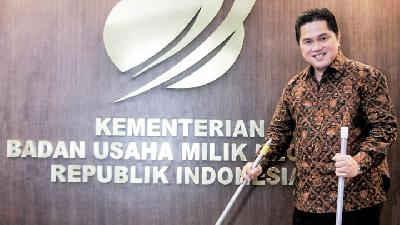
Right after he took over the position of State-Owned Enterprises (SOEs) Minister from Rini Soemarno, Erick Thohir immediately buckled down to work.
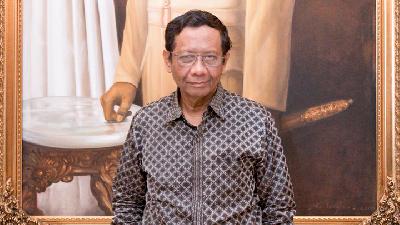
LAST Wednesday, October 23, was a long day for Mohammad Mahfud Md. He was at the Presidential Palace bright and early to be sworn in as the coordinating minister for political, legal and security affairs.
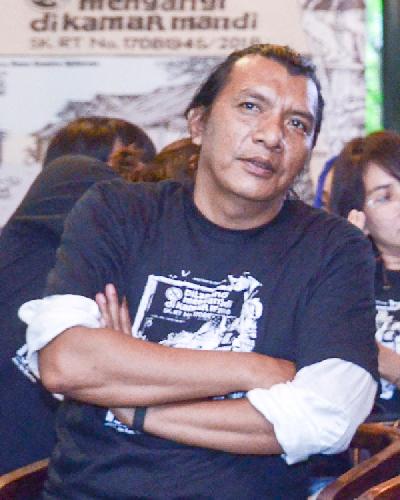
THE digital revolution was once cause for 48-year-old filmmaker John De Rantau to stop making movies.
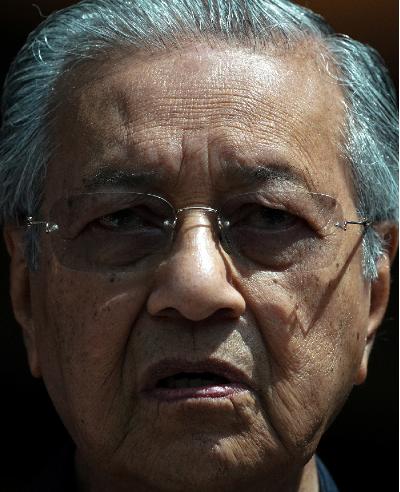
After resigning from his position as Prime Minister of Malaysia in 2003, Mahathir Mohamad wanted to enjoy his retirement.

Paloh residents are helping protect sea turtles along the regency’s coast. WWF offered to provide guidance.

FORMER WBA boxing champion from Indonesia, 38-year-old Chris John, has decided to enter into the political ring.

The police arrested members of an alcohol smuggling syndicate that has been in operation for 20 years. A licensed import company is also suspected of involvement.

The Indonesian government’s response to the persecution of the Rohingya people is ill-targeted. It should have focused on the cessation of violence.

Johannes Marliem was in contact with Tempo reporter Indri Maulidar from the end of July to early August.

The calculations for business projections are not as accurate as the results of physics formulas. There are many uncertainties that need to be anticipated. Professor Yohanes Surya should have realized this so that the Surya University, which he founded in 2013, would not have experienced financial difficulties. After achieving fame for schooling the Indonesian Physics Olympiad Team, he now faces the complexities of the education business. His subsequent actions should be scrutinized by the Ministry of Research, Technology and Higher Education so there are no losses to the public.

We must be willing to take risks if we want to do something good for this nation." Yohanes Surya said in an interview with Tempo in May 2013, as he explained how the Surya University was funded. Four years later, his decision to take risks have led to potential legal consequences.

The Bangladesh governments plan to relocate thousands of Rohingya refugees to a remote island is met with international outcry.

Ten ASEAN foreign ministers reconvened at the ASEAN Foreign Ministers' Retreat in Yangon, Myanmar, on December 19 to discuss the recent development of Rakhine State and the plight of the Rohingyas. "Protection of human rights for all citizens, including the Muslims in Rakhine State, must be upheld with inclusive approach," said the Indonesian Foreign Minister Retno Marsudi.
Retno requested the Burmese State Counsellor Aung San Suu Kyi to allow wider access for humanitarian aid from ASEAN states. She added that Indonesia is ready to assist, not only in providing aid, but also capacity building in different sectors. "Indonesia is also willing to facilitate interfaith dialogue, to encourage efforts for reconciliation in Rakhine State," she said.

Minister for Women's Empowerment and Child Protection Yohana Susana Yembise, 58, cannot afford to take it easy yet, even though Law No. 35/2014 is ready to be enacted. Better known as the Bill on Castration, this piece of legislation will soon be deliberated on at the House of Representatives (DPR).
The bill was drafted by three ministries at the instruction of President Joko Widodo as a response to the emerging cases of sexual abuse. The ministries involved are the ministries coordinating human development and culture, social affairs and women's empowerment and child protection. "The President has instructed the attorney-general and me to monitor the passage of the bill," said Yohana in a recent interview.

The Sittwe area, where the Rohingyas live in Myanmar, was tightly guarded by the police and the military. Dyah Prabandari's guideas well as her information-providerhad to smart-talk his way past the heavy security to enter the village where Prabandari's source lived.
Being a guide and source of information to Prabandari was by no means an easy job for 20-year-old Sadak Husain. The Rakhine state police had come to Sadak's home at Dapaing, a suburb of Sittwe, the night before, inquiring about the identity of his foreign guest and the purpose of her visit. Sadak had to endure 20 minutes of agonizing questioning before the security people left him alone.

In a corner of the Central Kalimantan Movement Against the Haze (Gerakan Anti-Asap, or GAA) office in Palangkaraya, Kartika sang to her daughter Lintang so she would go to sleep. The three-year-old toddler coughed several times, making it difficult for her to sleep. Lintang's health had become worse with the onslaught of the haze in mid-October.
On the night of October 17, GAA volunteers debated on whether to evacuate residents of Palangkaraya to Banjarmasin in South Kalimantan. Kartika, 31, a GAA volunteer, listened to the argument while she tried to put Lintang to sleep. She was at the office with her husband Rama Dhany, an activist working with the Alliance of Agrarian Reform Movements. Together with GAA coordinator Aryo Nugroho Waluyo, 28, he proposed the evacuation. Dhany knew people in Banjarmasin.

There has been no evidence that money has passed into the hands of the leader of NasDem Party, a member of the ruling coalition. But the testimony of North Sumatra Governor Gatot Pujo Nugroho and former Nasdem Secretary-General Patrice Rio Capella chargess that Surya knew about the bribery. Surya's message to Patrice about being 'careful' shows his blessing or secret approval of the transaction.
The story began with the arrest in July of three judges from the North Sumatra State Administrative Court, by the Corruption Eradication Commission (KPK). Nabbed along with them was the court clerk nd an advocate from the law firm O.C. Kaligis & Associates. The judges were caught red-handed accepting a bribe from Mohammad Yagari Bhastara, aka Gerry, an attorney. The bribe was paid so the judges would favor Gatot, who had filed a lawsuit against the Attorney-General's Office (AGO) for questioning him over the social assistance program in his province.

Early evening two weeks ago, National Democrat (NasDem) Party Chairman Surya Paloh arrived unscheduled at the headquarters of the Corruption Eradication Commission (KPK) in South Jakarta. He came a few hours after the NasDem Party Secretary-General Rio Capella was arrested.
Surya came to the KPK in response to a summons for his testimony as a witness in a case. "I am a witness for Rio and Gatot Pujo Nugroho," said Surya. "The faster I do it, the better."

AS a Corruption Eradication Commission (KPK) detainee, Gatot Pujo Nugroho spends his days behind bars at Cipinang prison in East Jakarta. The North Sumatra Governor has been in detention since August 3, following his indictment for bribery, a week earlier.
Gatot Pujo and his wife, Evy Susanti, have been charged with bribing the Medan Administrative Court judges. They were indicted after KPK investigators caught red-handed the judges and M. Yagari Bhastara, a lawyer from O.C. Kaligis' law firm.

A little over one year ago, author Goenawan Mohamad in righteous anger pointed out to the Goethe Institute in Jakarta that Indonesia had done nothing to prepare for the Frankfurt Book Fair. "You gave us five years' notice. It is now year four and nothing has been done. A new government will be in place, with no time to attend to a book fair, however important. So I suggest, with due respect, that the German ambassador offer this honorable opportunity to Malaysia instead," he said, shocking participants at the meeting. The tables were turned. Goenawan was offered the position to chair the national committee to the prestigious event.

The heat did not seem to bother Johannes 'Jan' Pronk, 75, even though it has been 13 years since he last visited Indonesia. Perhaps it was a residue from the past, when he frequently travelled to Indonesia in his capacity as the Netherland's foreign minister and the UN's special envoy, and when he got acclimatized to the tropical, humid heat.
The bespectacled Pronk fits the description of a professor, rather than a politician and a diplomat of his yesteryears, given his current job as visiting professor at the United Nations University of Peace in Costa Rica and a lecturer at Amsterdam University College in the Netherlands.

According to the Global Financial Inclusion Index, Indonesia's position falls below 20 percent, lower than Malaysia (66 percent) and Thailand (77 percent). To improve conditions, the government recently amendended Law No. 1/2013 on micro-financing agencies (LKM) to give the marginalized people more access to financial services. The Financial Services Authority (OJK) was then given the mandate to formalize more than 630,000 LKM all over Indonesia so that they can comply with existing regulations.
Mohamad Ihsanuddin, however, admitted that this was not easy. "We must promote it and educate civil servants in the regencies to supervise and monitor the LKM," he said. The OJK is given until January 2016, exactly one year after the law took effect, to ensure that those micro-financing agencies have the proper licenses to run their businesses, a very challenging task for an agency that was set up only three years ago. Ihsan spoke to Tempo English reporter Amanda Siddharta at his office last week.

TODAY, there are only 20,000 known researchers in Indonesia, although those actively conducting studies and surveys number a mere 1,000 persons. This acute shortage is a big concern to Yohanes Surya, physicist and trainer of the Indonesian Physics Olympics team since 1993. "The United States is advanced because it has 1.5 million researchers of their 400 million strong population. If we could ony have one million, we would be doing all right," said Yohanes.

Mohamad Al-Arief has lived in Washington, D.C., USA, for the past 10 years, as a senior officer at the World Bank headquarters. Despite frequent travels to more than 50 countries, as part of his job, his heart remains in his home country, Indonesia. Arief, who is also president of the Indonesian Diaspora Network (IDN) Global, continuously thinks of ways he and other members of the Indonesian diaspora can contribute to the nation.
He figures one way would be to convene the hundreds of thousands of other Indonesians living overseas at the 3rd Congress of Indonesian Diaspora on August 12-14 in Jakarta. "We are garnering our collective efforts to discuss on how we can share our expertise and experience," he said.

AFTER twice summoned to provide an explanation for his actions, North Sumatra Governor, Gatot Pujo Nugroho was indicted for bribery last week. A few hours before the announcement was made by the Corruption Eradication Commission (KPK), Gatot held a short press conference at a hotel not far from the KPK office in South Jakarta. Gatot's second wife, Evi Susanti, who was also indicted for the same crime, was present at the occasion.

When Indonesian, Malaysian and Thai security forces drove away boats filled with hundreds of ethnic Rohingya fleeing their home country of Myanmar, citizens of Simpang Tiga village in East Aceh accepted them with open arms.
These exiles, who sailed across the ocean for six months on wooden boats, were received by the Acehnese. They were given food, clothing, medicine and put in schools alongside local children. These Acehnese villagers have performed a humanitarian gesture that government and the highest international bodies are still harping about.

ABU Tahay does not spend much of his time in his village of Bhuthidaung, in Rakhine State. This Rohingya community leader and founder of the United National Development Party only goes back to campaign before elections. "And even then I'm tightly guarded by security forces," whose other name is Tha Aye, told Tempo reporter Purwani Diyah Prabandari at his party headquarters, at a shop-house complex in Yangon, Myanmar, last week. He can actually go back anytime to Rakhine, but it's a big hassle. "We must fill out forms," he said, even though he is a resident of Yangon, and not of Rakhine.

There are many obstacles to becoming a research university, among them funding, which is not much and the fact that research has yet to become a culture of higher learning in this nation. To look into this subject further, Tempo reporters Erwin Zachri and Gabriel Titiyoga spoke with Research Technology and Higher Education Minister, Mohamad Nasir at his office last week.

Clean and potable water do not come easily to Indonesians. So far, according to the Mineral and Natural Resources Ministry, only 68.9 percent of the population have access to clean water while only 20 percent get potable water. Given the government's inability to provide water supply, the poor are usually the worst off. "To meet basic needs, the government is able to provide the poor with rice, but with water? No such program exists," Roh Santoso Budi Waspodo, 52, who teaches hydrology at the Bogor Institute of Agriculture's Faculty of Civil Engineering and Environment told Tempo English.
Roh is quite familiar with problems relating to clean water supply. In the 2000s, he initiated a clean water project in Banten. He assisted the Public Works Ministry to supply potable water in coastal areas and small islands from 2004 to 2005. Besides teaching, one of his activities is to map out water sources for a private company. According to Roh, there are alternative ways to access clean and potable water. "We should not be dependent on the state-run water supply company," he urged. Contributor Lina Wulandari interviewed Roh two weeks ago.

THE position of KPK spokesman seems to be a permanent part of Johan Budi Sapto Prabowo, no matter what other position he takes. He actually had submitted his resignation letter when he was deputy for prevention. But in the middle of the crisis following the indictment of Police Comr. Gen. Budi Gunawan as a corruption suspect, the KPK leaders asked him to act as their spokesman.

SURYA Paloh, 63, is never far from the center of power. From the time of the New Order era up to the government of Susilo Bambang Yudhoyono which recently ended its term, Surya has managed to be in the orbit of the political elite. Today, at the start of the Joko Widodo-Jusuf Kalla administration, Surya placed functionaries of his NasDem Party in key positions of the Working Cabinet.
Last week, the president appointed NasDem legislator Prasetyo as the new attorney general. Barely five years old, the NasDem Party can now claim to have succeeded in securing three ministries. They are the Forestry and Environmental Affairs Ministry led by Siti Nurbaya, Spatial and Agrarian Affairs Ministry led by Ferry Mursyidan Baldan, and the Coordinating Ministry for Politics, Law and Security, which is led by Admiral (ret.) Tedjo Edhy Purdijatno.

Police Comr. Gen. (ret.) Noegroho Djajoesman, 68, owns a law consulting firm, so the former police chief of metropolitan Jakarta provided a lawyer from his office to represent Raden Nuh, who is being charged with extortion. Noegroho often converses with Raden, although he claims to know nothing about the Twitter or the Trimacan2000 and TM2000Back online accounts. Last week, Tempo met with Noegroho in his South Jakarta home, accompanied by Endi Martono, the lawyer appointed to represent Raden.
Your name was often mentioned by Raden Nuh. Do you know him well?
I was introduced to him by a journalist, back in mid 2012, after Jokowi became governor. He came and we conversed. I enjoy talking to young people because they're idealistic. (Raden claimed to have known Noegroho long before 2012).

Abu Tahay, the founder of the National Democratic Party for Development, has never stopped fighting for the recognition of the Rohingyas as citizens of Myanmar. He travels around the world to gather support so that they will no longer be considered illegal immigrants. He keeps old historical documents that prove the Rohingyas are legitimately part of Myanmar.
"The Rohingya people have been there before the 18thcentury. This is based on the document published in 1799 which confirms the Rohingyas were there," said Tahay, showing the documents during his recent visit to the Tempo office two weeks ago.

As of last week, she had yet to present her credentials to President Susilo Bambang Yudhoyono, but Swedish Ambassador-Designate, Johanna Brismar Skook was already busy catering to visiting officials from her homeland, and escorting them to appointments with their counterparts.

The recent Sixth UN Global Forum on the Alliance of Civilizations, which is aimed at mobilizing action against extremism through the forging of international, intercultural and interreligious dialogue, brought together world leaders and luminaries to Bali, venue of the conference. Among them was 60-year-old John Ashe, an Antiguan national who currently chairs the 68th United Nations General Assembly. Ashe, who holds a doctorate in bioengineering, is no stranger to global affairs, having been involved with the UN since 1989, at first working in his country's permanent representative office and subsequently serving in various UN agencies and as his country's ambassador, before taking up his current posting. He spoke to Tempo English reporter, Yuli Ismartono, on a number of global issues. Excerpts:

The Meulaboh District Court in Aceh has upheld the lawsuit by the Environment Ministry against a palm oil company which set fire to peatlands. This is the first such win.

Human rights violations against the Rohingya ethnic minority in Myanmar have reportedly been committed. It is time for Indonesia to play its diplomatic role.

A team of scientists from the Max-Planck Institute for Astrophysics led by Indonesian astronomer Johny Setiawan discovered two planets in the most unlikely place, prompting a revision of the theory of planetary creation.

Riot is Tohpati's most natural musical expression. Its composition is not superfluous and is gracious in its execution.

Even without religious-based regulations, the alcohol problem in this town is slowly being resolved.

The play Nyai Ontosoroh was again performed at Teater Salihara. New experiences and an inner power were evident after performing in the Netherlands and Belgium.

The duty on alcoholic beverages has been tripled. Local beer producers must pay the most.

The ornamental plants of Tomohon have very promising potential to scoop foreign exchange. Apart from being exported, they also attract tourists with annual flower festivals.

Together with Karen Armstrong, he was known as “Islam’s Ambassador” to the West. John Louis Esposito has often been described as a bridge that links an understanding of Islam to people in the West. Esposito, who is Catholic, has spent decades studying Islam and writing books, discussing and explaining about Islam as a religion of peace and humanity.

THE future of Pasar Johar (Johar Market) in Semarang, Central Java, designed by Herman Thomas Karsten, is becoming more and more uncertain. The market with its unique architectural design, in the form of a mushroom-shaped roof, has escaped demolition by the Semarang City Government a number of times. The rationale for demolition is revitalization. There is an investor who is willing to replace the marketplace with a six-story building. The most recent recommendation is to elevate the marketplace built in 1939, in order to avoid high tides. The various plans will not only threaten cultural preservation, but also eliminate the livelihoods of those who have depended on the “big village” called Pasar Johar for decades.

Those who first returned after the tsunami joined hands to rebuild their village. Now Lam Teungoh has a new story.

After much delay, construction is finally underway on the vital economic road to Meulaboh. But problems remain, the most serious being the acquisition of land needed to build new sections of the tsunami-damaged road.

US missile strikes have rocketed al-Jazeera television to the peak of fame. When Kabul was under attack, its television crew chose to stay on and become a witness to the savagery of war. While American guided missiles laid waste to Baghdad, their determination was repeatedly tested. During this period one of its reporters was killed when an explosion tore through its office. Through all these sacrifices, al-Jazeera has now become the most prominent television network in the Middle East and is quite influential elsewhere in the world. Its determination to break down the domination of Western media, though, continues to bring it threats and suspicion. Following is a report from TEMPO reporter Rommy Fibri, who called on its headquarters in Doha, Qatar, last month.

These are the results of the earth conference in Johannesburg. What do they mean to Indonesia?

The Earth Summit in Johannesburg has achieved important accords, but several issues continue to face stumbling blocks posed by rich nations.

It could so happen that Toh Guru was born to oppose Mahathir Mohamad. Then again perhaps not. But for most of his life Toh Guru has taken an opposing stance to the Malaysian Prime Minister.

It may well be the case that the intellectual level of a particular nation is measured by the number of its thinkers that you can find in an encyclopedia. Unfortunately, there are not so many Indonesian thinkers to be found in encyclopedias even though Indonesia is the largest Islamic country in the world. Now John L. Esposito's Oxford Encyclopedia of the Modern Islamic World has been translated into Bahasa Indonesia and is published by Mizan. We took the opportunity of having a look at Esposito's encyclopedia and also ask why so few of our thinkers have entries named after them.

The new rule of the minister of trade and industry concerning alcoholic drinks deserves criticism for creating a monopoly rather than better supervision.

Jokowi is believed to have intervened in making Bahlil Lahadalia general chairperson of the Golkar Party.
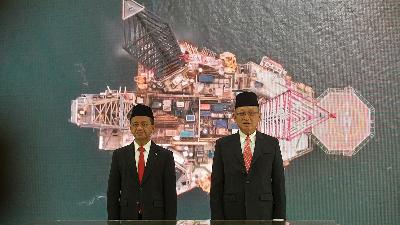
Just months before the end of his term, Jokowi appointed Bahlil Lahadalia as Energy and Mineral Resources Minister. The position is considered prone to conflicts of interest.
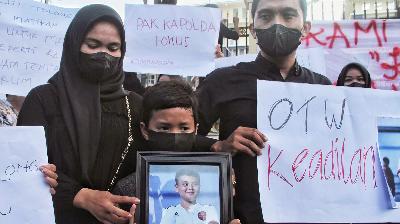
Thirteen-year-old Afif Maulana was found dead under a bridge in Padang, West Sumatra. He had allegedly been tortured by the police.
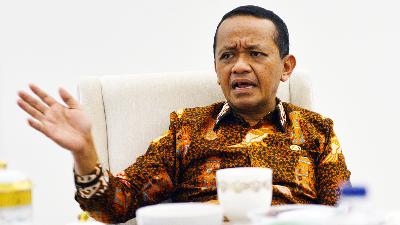
Interview with Minister of Investment Bahlil Lahadalia about mining business permits IUP for mass organizations, and the debate with Luhut Pandjaitan.
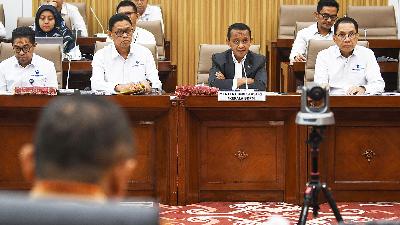
The role of Bahlil Lahadalia in revoking mining business licenses draws attention of the House of Representatives and civil society groups, amidst concerns of possible licensing corruption.

The number of Indonesian umrah minor pilgrimage travelers grows during the fasting month of Ramadan. The nation’s umrah economic potential has not been fully harnessed.
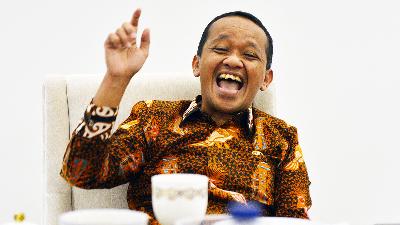
Bahlil Lahadalia explains the uproar over the revocation of mining permits as well as alleged extortion of money and shares in exchange for reinstatement of the permits.
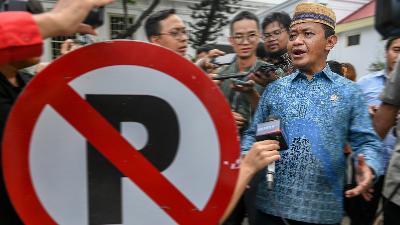
Bahlil Lahadalia has a glimmering political and businees career. He is aiming for Golkar Party’s top position.

The claim that the Gunung Padang site is the oldest pyramid in the world is strongly challenged. A collaboration of researchers from around the world is needed.
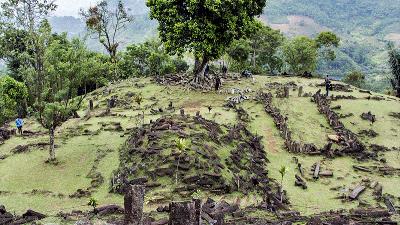
Foreign archeologists doubt the site of Gunung Padang as the world’s oldest pyramid. A journal publisher is going to investigate.

Top management of Bank Mayapada allegedly obtained kickbacks from customer credit disbursements. The OJK was lax in their oversight of this bank owned by a member of the Presidential Advisory Council.
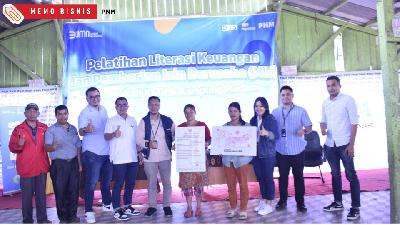
The concept of Kampung Madani is to optimize the business and economic potential of the region. #InfoTempo
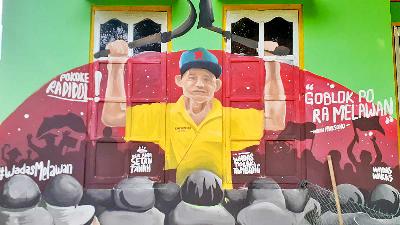
Some villagers in Wadas have been fighting against the plan to mine andesite in the village for years. These protestors and the activists assisting them have been subject to various efforts to intimidate.
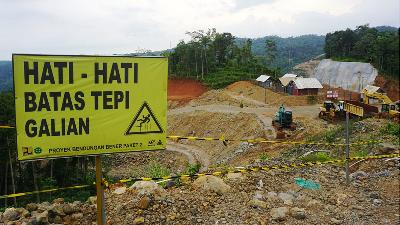
The government is insistent on excavating andesite rock in Wadas village. Opening the mine to build a dam altered the zoning regulations and ignores potential landslides.

Poaching produce in the North Natuna Sea is not only triggered by economic need. According to the Director of the Fleet Monitoring and Operations of the Marine and Fisheries Resources Directorate-General in the Maritime Affairs and Fisheries Ministry, Pung Nugroho Saksono, a conflict similar to the Sipadan-Ligitan case between Malaysia and Indonesia should not be allowed to recur.

Being an ambassador will be a new experience for both Todung Mulya Lubis and Muliaman Darmansyah Hadad.

Slamet Ambari, as Jadag in the film Turah, won Tempo’s Best Actor because of his impressive portrayal of a frustrated character.

Organic coffee farming in Kiadan Plaga is the main source of income. It is also a vehicle for the village’s brand of ecotourism.~

Rizieq Syihab, charged in a pornography offense, did not show up at his scheduled questioning at the Jakarta police headquarters on April 25. He said he wanted to travel to Mecca, Saudi Arabia, to perform the lesser pilgrimage (umrah). This Grand Imam of the Islam Defenders Front (FPI) promised he would be present for questioning upon returning from the Holy Land in mid-May. However, the post-Ramadan fasting month holiday has passed and he has yet to return to Indonesia.

LAST Wednesday an Achmad Sadali abstract painting created in 1973 was on display on the mezzanine floor of the Energy Building in Senayan, South Jakarta. Hundreds of people visiting the exhibition were seen immersed in the beauty and detail of the painting. It is not every day that the public gets to enjoy the painting from Arifin Panigoro's collection, by a painter known as the founder of the Bandung school.

When he was still the inspector-general at the Ministry of Finance three months ago, Kiagus Ahmad Badaruddin, 59, was angered by a report on a sum of Rp3 billion that had been deposited into his wife's account. It shook him, particularly since he was being considered for the position of chairman of the Center for Financial Transactions Reporting and Analysis (PPATK).
That report spread to the Presidential Palace and to the finance ministry. Finance Minister Sri Mulyani, who recommended Badaruddin to be PPATK chief, took a deeper look at the report. "She asked me what the money was all about," recounted Badaraddin, or Badar as he is familiarly known.

When he was still the inspector-general at the Ministry of Finance three months ago, Kiagus Ahmad Badaruddin, 59, was angered by a report on a sum of Rp3 billion that had been deposited into his wife's account. It shook him, particularly since he was being considered for the position of chairman of the Center for Financial Transactions Reporting and Analysis (PPATK).
That report spread to the Presidential Palace and to the finance ministry. Finance Minister Sri Mulyani, who recommended Badaruddin to be PPATK chief, took a deeper look at the report. "She asked me what the money was all about," recounted Badaraddin, or Badar as he is familiarly known.

The chairman of the Financial Services Authority (OJK), Muliaman Hadad, 56, is optimistic about the coming year. He believes Indonesia will greet the coming year with growth exceeding the 5.2 percent target set by the government. "We can do it if we harness domestic potential optimally and continue with our reforms and transformation programs to enable investment," said Muliaman.
His views do not reflect those of global economic leaders who met at the annual conference of the World Bank and International Monetary Fund (IMF) in Washington, DC recently, at which Muliaman himself attended. Participants at the meeting proclaimed that the world economy was growing exceedingly slow, taking far too long to recover and benefitted only a handful of people. They concluded that the weakening of the global economy which began in 2014, had yet to recover in the coming year.

Corruption is suspected in the procurement of the TNI's six new sets of radars. The BPK and the KPK must be given access to scrutinize the transaction.

AIDUL Fitriciada Azhari, 48, turned out to be the dark horse in the search for a chairman of the Judicial Commission. He was a last-minute entry after the House of Representatives' (DPR) law commission rejected two of the candidates, and he got the job. "I wasn't even under consideration so it was just pure chance," said Aidul at his Jakarta office last week.
He is now responsible for completing the work to be done by the commission, from reinforcing its legitimacy to ironing out relations with the Supreme Court and addressing the problem of judges' safety. "All this is to protect the integrity of the judiciary," he told Tempo reporters Tulus Wijanarko, Fransisco Rosarians and Raymundus Rikang.

After the noon prayers, Irzal Rakhmadani, 24, packed his things in a rucksack and went out. Two items he never goes without are his stethoscope and sphygmometer. He would ride on his motorbike to the office of the World Wild Fund for Nature (WWF) in Palangkaraya, Central Kalimantan, three kilometers away. There, he would treat people suffering from the effects of forest fire smoke around Palangkaraya. In 2015, he treated some 1,000 patients.
In mid-September, Irzal and his colleagues visited a camp for workers who had been laid off by an oil palm company. Fifteen volunteers of Earth Hour Palangkaraya had gathered to help the smoke victims there. Irzal saw something that distressed him. About 300 people were crammed into a 5x15 meter barrack. Because there was not enough room, tarpaulin tents had been set up outside the barracks. People lived alongside chicken and their pet dogs.

Magnus Ekbom stepped into a meeting room in a building on Jalan Rasuna Said in Kuningan, where the e-commerce company has just moved its offices a few months ago to accomodate his growing team.
At the helm of Lazada since 2012, Ekbom has ushered the online shopping platform to be the biggest in Indonesia. But he is not planning to take a breather just yet. For Ekbom, running an e-commerce company is like running in a marathon. "And we're only in the first couple of kilometers down the line," he said.

According to Prasada Rao, ignorance has been the biggest barrier in dealing with the decades-old HIV/AIDS epidemic. This is why he speaks openly about the disease, freely discussing such topics as sex and sex education, which most Asians see as taboo, so that the social stigma attached to its victims can be erased, a first step in the prevention and treatment of the disease.
Rao truly believes that an open discussion of the subject would be the best protection against the disease, yet the biggest challenge in addressing this global epidemic. "For Asians, sex is taboo. It's in your bedroom, not on the road. So there's always that challenge," he told Tempo.

TWO hours into a pleasant voyage on the waters of the Padaido group of islands to the south of Biak in Papua, the situation became tense. That Saturday morning two weeks ago, photographer Tony Hartawan and I had just passed Pakreki island. The waters around this large unoccupied, rocky island covered in lush tropical forest, seemed to be a final test for us before arriving at our destination: Meosmangguandi island.
The sea, which had earlier been quite calm, suddenly became very rough. Suddenly, our boat, a 'johnson' perahu, as local fishermen call their traditional boats with attached engines, was hit by waves coming from all directions. Tony, who was sitting in the stern, several times glanced to the rear, a fixed smile on his face. I responded with no less a worried expression. "Meosmangguandi!" The shout from Melkias Rumkorem, a traditional Meosmangguandi elder, brought with it a new sense of calm. He pointed towards where the boat was heading, all while it was rising, falling and rolling from side to side over the waves.

Engraved on a 15-meter-high stone pillar are 14 eternal edicts. Carved in the 2nd century BCE, the edicts were made by Piyadasi or Devanampiyadasi, the king who ruled the area that now forms most of India.
Almost all its lines are fascinating, but the most stirring is the seventh edict:

THE Energy and Mineral Resources Ministry has an ambitious plan for next year: raising the budget for the development of renewable energy by 10 times. "The future of Indonesia's development depends on seeking and building renewable energy. We can no longer rely solely on fossil fuel energy, which is bound to become scarce," said Dadan Kusdiana, director of the ministry's section on bio-energy.

A strain of wheat developed by researchers at the Andalas University School of Agriculture in Padang, West Sumatra-the Galur SO-3, or GURI 6 UNAND-has been identified as one of four superior varieties of wheat by the Cereal Plant Research Center last November.

Rice, rendang beef stew, jackfruit curry and many kinds of sambal (chili paste) sit in the front lanjar (guestroom) of Etek Nuraini's traditional rumah gadang house in Nagari Sumpur, in the Tanah Datar regency of West Sumatra. It is early in the month of February. Some 40 guests have gathered, including village elders and West Sumatra Governor Irwan Prayitno. Guests sit on the floor, eating side-by-side. Prayers are recited for the safety and wellbeing of those who will inhabit the house. Family photos hang on the wall. Windows are left open to let sunlight in.
From the vantage of the dining area, the house's spacious interior is in clear view. Six jua (Cassia siamea) pillars grace the building's 17-meter-long sides. Jua, a type of ulin ironwood, is extremely durable: once dry, its impossible to cut it down to size. The walls, meanwhile, are made of surian (Toona ciliata), and floors from bayur (pterospermum javanicum) tree trunks.

Forty young men strain and groan, taut muscles shining with sweat as they haul a jua tree (Cassia siamea) out from a ravine near Singkarak Lake, West Sumatra. The trunk is 11 meters long and will be used as the main pillar in a rumah gadang (traditional Minangkabau house). The house is being built for the heirs of Etek Siti Fatimah in the hamlet of Nagari, Sumpur village, Tanah Datar regency. Etek is what locals call an aunt, or a respected female figure.
The men take turns pulling the tree up and out of the gully. Shortly after noon, they reach the top. After clearing another small rise they toss the trunk down the other side, watching it tumble downhill.

Fighting corruption is nothing new in Indonesia. But the battle fought by people in rural areas may be something that is little known by the general public. According to Zainal Arifin Mochtar, Director of the Center for Anti-Corruption Studies at Gadjah Mada University, efforts by villagers to fight corruption have to be considered significant, because so far, awareness about fighting it is mostly present amongst the middle classes in urban centers.
Urban communities are generally better informed and they are abetted by the many anti-corruption activists in towns. But when anti-corruption figures in the country's remote areas begin to emerge, it is a most important development.

The banking business is in a flux as a result of the war of interest rates among banks. But the owner of the Mayapada Group, Dato Sri Tahir, is optimistic that the banking sector in Indonesia will continue to grow. "Growth depends on situations and conditions," Tahir told Tempo, two weeks ago. Having travelled all over the world, Tahir concluded that the best investment opportunities are still found in Indonesia.
He believes that investment opportunities in Indonesia are still better and that includes the business prospects of his Mayapada Group. He told Tempo reporter Christine Munthe in an interview that he would never sell Mayapada for whatever price. Excerpts:

A national research team has discovered ancient buildings and artifacts at the Mount Padang archaeological site in, Cianjur regency, West Java. The team's deputy chairman for geology, Danny Hilman Natawidjadja, said they had found a 22-centimeter-long stone rod on the mountain's southern slope, about two or three meters below the surface. The rod has pores and magnetic characteristics that attract it to metal. "It resembles Harry Potter's magic wand, which is fit for gripping," Danny said last week.
Other finds included knife-shaped metals, metal waste and burned soil with stacks of stones beneath. Based on laboratory tests, the burned residual materials have been in the location since 5,200 BC.

The face on one of the terracotta piggybanks at the Majapahit Museum in Trowulan, East Java, has chubby cheeks and slanted eyes. The right and left eyebrows are connected, curving dramatically like a wave. The lips seem to smile faintly, expanding the already thick chin.
This is the piggybank Muhammad Yamin saw decades ago and declared the face of Gajah Mada. In reality, poet Sapardi Djoko Damono contends, that face bears more resemblance to Yamin himself. Sapardi thinks the real face of Gajah Mada was not as chubby as the terracotta figure's. Agus Aris Munandar, a University of Indonesia archeologist who has studied Gajah Mada, also differs from Yamin in his interpretation of the face of the man who uttered the legendary Sumpah Palapa (Palapa Pledge), in which Gajah Mada vowed not to eat any spices until he had conquered the whole of the Nusantara archipelago for the Majapahit empire.

Indonesia is Canada's biggest export market in the Association of Southeast Asian Nations (ASEAN). To further strengthen the two countries' economic relations, Canadian Foreign Minister John Baird visited his Indonesian counterpart, Marty Natalegawa, on Tuesday last week.
During a press conference at the Pancasila Building in Jakarta, Baird expressed Canada's interest in cooperating with Indonesia in a number of sectors. "We want the same thing: work opportunities and improvement in people's welfare," he said. According to Marty, one of the sectors the Northern American country wants to focus on is transportation. "Canada's investment is highly positive," Marty said.

The KPK is looking into the connection between Toto Hutagalung and Bandung Mayor Dada Rosada in the bribery case of Judge Setyabudi. Allegedly, Toto often got projects from Dada.

Madakaripura, Gajah Mada's last abode, is not in Probolinggo, as has been long believed, but in Pasuruan.

A cross-disciplinary team of scientists is studying a controversial archeological site: Mount Padang. Is it true the site is 10 times larger than Borobudur?

The month of Ramadan (fasting) will end with the Idul Fitri holidays, a cause for joyous celebration. Young and old, the high and the low, will come together in a new beginning, marked by day-long feasting and fun. But there will also be a sobering moment of spiritual reconnection, of forgiveness and joint prayers, giving thanks to the greatness of God Almighty. At this joyous time, Tempo English Edition presents a special photo essay of Ramadan celebration in eastern Indonesia.

The population of bidadari (Standardwing) birds, the mascot of North Maluku, is gradually restored. A group of young bird lovers in Halmahera plays a major role.

A mining company filed a lawsuit against Radar Tegal. The media is deemed to have violated procedures in the Press Law.

The management of Soekarno-Hatta Airport is muddled due to aged power and radar systems.

In several villages in Ngada regency, Central Flores, water was once a rarity frequently fought for. Locals finally managed to “penetrate” water springs through three-village cooperation.

Lombok’s Sasak Muslims enjoy unique traditions during Ramadan.

Bloggers in Malaysia united to ridicule and criticize Prime Minister Abdullah Badawi, but Pak Lah, as he is familiarly known, withstood the onslaught.

Eight pairs of candidates for gubernatorial posts signed a declaration for peaceful regional heads elections (Pilkada) last Thursday. The ceremony took place before the Baiturrahman Grand Mosque, Banda Aceh.

THE life rhythm of this youth suddenly changed in mid-July. He is now spotlighted, photographed, interviewed and gets to meet all kinds of people. Jonathan Pradana Mailoa is receiving praises galore because he is the shining star in a nation that is going through so much darkness: earthquakes, floods, famine and that endless disease called corruption. Indonesias reputation went up a notch through the brilliance of this 16-year-old, when he became the absolute winner of the 37th International Physics Olympics, held in Singapore and participated in by 86 countries.

Even before the verdict handed down in The Hague last Tuesday, Malaysia had long been occupying Sipadan and Ligitan. TEMPO journalist Wenseslaus Manggut, who recently traveled to the islands, was unceremoniously told to leave in no uncertain terms by the Malaysian Police.

Semen Padang has rejected the governments wish to replace the companys board of directors. The reason for this was that financial performance was improving. Whats going on?

Expanding Padang restaurants apply a variety of business models to produce a remarkably consistent cuisine.

The planned sale of Semen Gresik-Padang-Tonasa has become extremely complicated since the West Sumatra DPRD and local government took over Semen Padang.

Police act excessively in handling the demonstrations nationwide in support of the Constitutional Court decision. Where are the President and Vice President?

The structure of Indonesian democracy is weakening because its foundations are being undermined. A Javanese word to describe the situation is nglimpe, which is to deceive secretly.

The latest revision to the Constitutional Court Law severely restricts the independence of Constitutional Court judges. Perpetuating authoritarian power.

The government and House of Representatives agreed to revise the Constitutional Court law to weaken the institution. There are indications of attempts to protect the Prabowo-Gibran government.
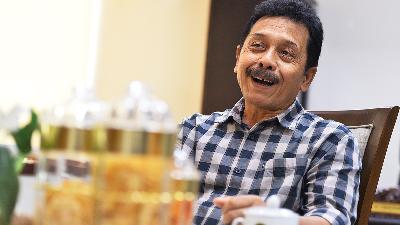
Constitutional Court’s Ethics Council Chair I Dewa Gede Palguna on his stance rejecting a revision to the Constitutional Court Law.
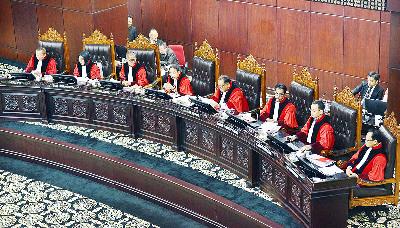
The Constitutional Court rejected lawsuits disputing the results of the 2024 presidential election. The option of disqualifying Gibran was discussed in a meeting of the judges.
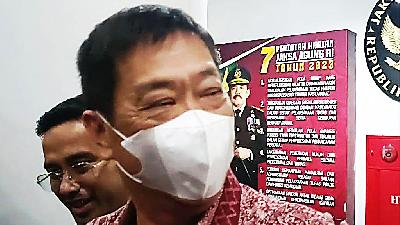
Robert Bonosusatya denies involvement in the Bangka Belitung tin corruption case. He often discusses tin business with other entrepreneurs.

Illegal tin mining is rampant in the waters of Bangka Belitung. The environmental damage is much greater than investigators estimated.

The situation in Gaza is getting worse for newborn babies and mothers giving birth.
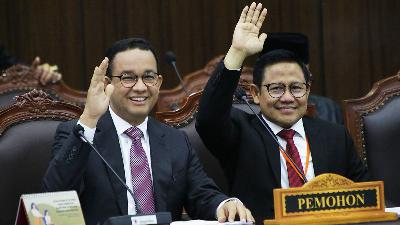
Anies and Ganjar can only rely on a lawsuit to the Constitutional Court because the route of the right of inquiry at the DPR is deadlocked. They are focusing on election interference by President Jokowi.
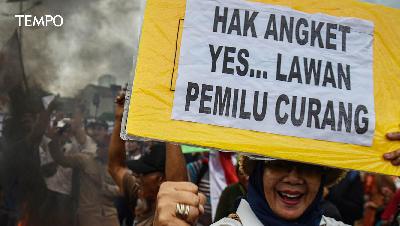
Anies and Ganjar, along with their campaign teams, are asking the Constitutional Court to annul the victory of Prabowo and Gibran. This is an opportunity to restore the Court’s honor.

Sihol Situngkir denies committing human trafficking in the ferienjob program. The employment agency obtained a 100-euro commission for every student.

KPAI Chair Ai Maryati Solihah on bullying cases in educational institutions such as the recent incidents at the Binus High School and an Islamic boarding school.
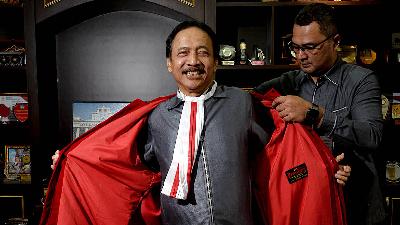
New Constitutional Court Chief Justice explains the efforts he is making to regain public trust of the Court following the Anwar Usman fiasco.

The violence in Bitung must not be allowed to spread. In the run up to the 2024 elections, there is a risk of horizontal conflicts breaking out.
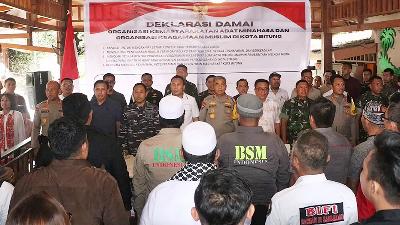
Police and authorities are setting up security strategies following clashes in Bitung. It has the potential to become a religious conflict.
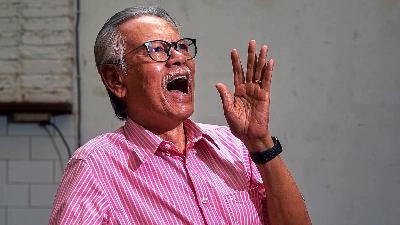
Erry Riyana Hardjapamekas had a meeting with the President before the Constitutional Court issued a ruling that allowed Gibran Rakabuming Raka to move forward as a vice presidential candidate.

Policy breakthroughs are needed to restore public trust in the Constitutional Court.

Anwar Usman breached the code of ethics. The Constitutional Court’s Ethics Council should dishonorably discharge him.
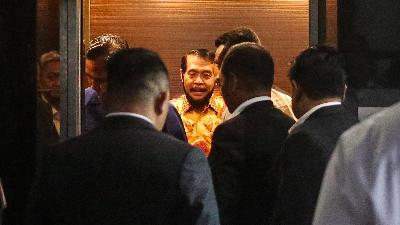
The Constitutional Court’s Ethics Council (MKMK) scrutinizes the role played by Constitutional Court Chief Justice Anwar Usman. The formation of the MKMK is being stalled.
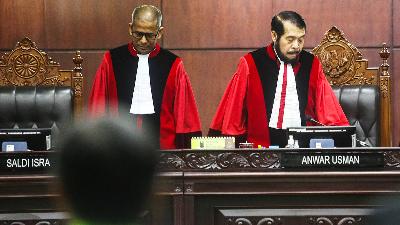
The Constitutional Court reportedly already made a decision in favor of a lawsuit regarding the minimum age requirement for presidential and vice-presidential candidates. The issue is rife with conflicts of interest.
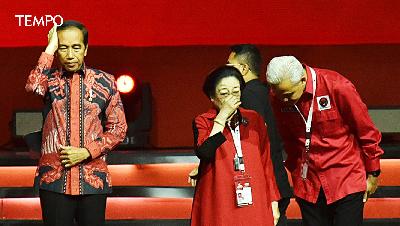
The Constitutional Court is handling the presidential-vice presidential candidates' age limit judicial review. Jokowi family's conflict of interest is thick.

Transpersonal psychology is a new branch of psychology that incorporates religion and spirituality.

There have been many attempts to extend the terms of office of public officials during Jokowi’s second administration. These are at odds with constitutional principles.

What lies within the rise of spiritual secularism?
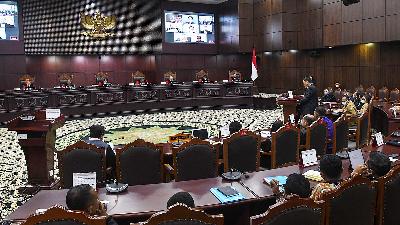
Weekly news summary, from widely voiced criticism aimed at the Constitutional Court to Jokowi’s move to reopen sea sand export that stirs public ire.

The Asset Forfeiture Law is important. It is dangerous if politics and the legal system are controlled by oligarchs.

The sanctions imposed on Guntur Hamzah and the selection of the Constitutional Court chief justice damage the authority of the institution. This is the unfortunate collapse of one of the products of the 1998 Reformasi.
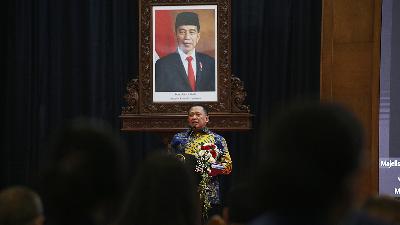
The plan to extend the President’s tenure is predicted to cause difficult deliberations on the amendment of the 1945 Constitution. There is concern that political interests may be at play.

Victims of sexual violence have the right to restitution in damages. Its mechanism is unclear.

The Constitutional Court ruled that the Job Creation Law is unconstitutional but ‘constitutional’. The ruling is riddled with compromises and intervention.
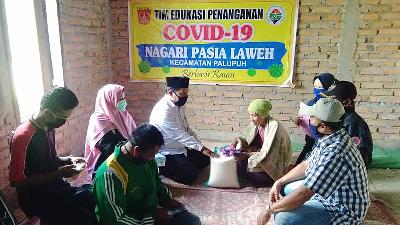
The Constitutional Court anointed Pasie Laweh a constitutional nagari. This is the result of innovative actions towards respecting people’s health and economic rights, and the right of application of customary law.

The PDI-P is pushing the National Research and Innovation Agency to become an autonomous institution. Megawati Soekarnoputri could potentially be appointed to chair its steering committee.
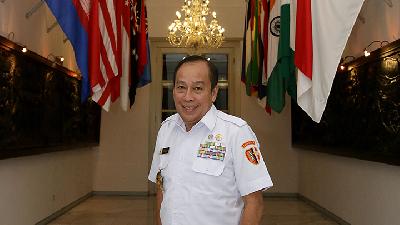
The army’s role in the recent sweeping operation to bring down the banners bearing Islam Defenders’ Front leader Muhammad Rizieq Shihab around Jakarta unsettled Agus Widjojo, governor of National Defense Institute (Lemhannas).

Ever since President Joko Widodo mentioned the need for decentralized coronavirus testing, Eijkman Molecular Biology Institute’s phone lines have not stopped ringing.

The domestic furniture industry is growing, both domestically and in exports. The gaps in the domestic market is an opportunity for local players. Design innovation and environmental standards need to be tightened in order to improve competitiveness.
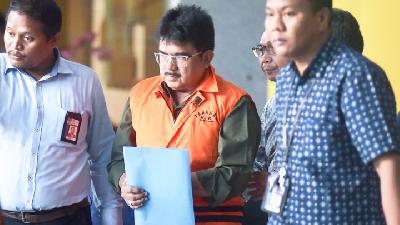
The Corruption Eradication Commission is investigating a bribery case related to tax restitution granted to Wahana Auto Ekamarga. A top executive from the parent company in Singapore is suspected to be involved.
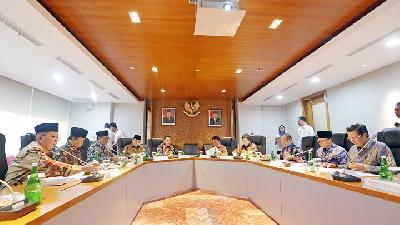
The proposed amendment to the constitution is not only about the state’s direction. Parties and senators have another agenda.
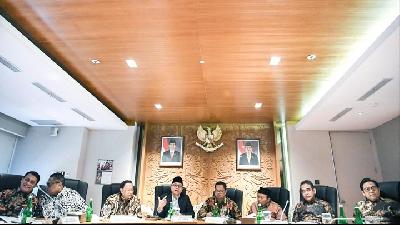
The PDI-P pushes for the amendment of the 1945 Constitution, creating holes to change major clauses including a president’s term in office.

ON Sunday, May 26, 2019, our family visited Situ Gunung, a tourist spot in Kadudampit subdistrict, Sukabumi Regency, West Java, about 10 kilometers from the town of Sukabumi.

VERY few people know of Nahum Situmorang (1908-1969). A dire lack of scholarly research and literature on the songwriter is one of the reasons. Yet Nahum Situmorang is a legendary song composer. In his lifetime, he wrote around 200 songs, most of which were composed at lapo tuak, or roadside palm wine drinking stalls. To this day in Medan, his songs are still being sung in roadside stalls, though not many know who wrote them. The most popularly performed Batak songs were written by someone who is now practically forgotten. In 1928, one of Nahum’s songs won second place in the competition to compose Indonesia’s national anthem. Alas, Nahum’s entry is now lost to the ages for not being filed and noted. To honor his achievements, a community of North Sumatran musician-artists celebrated Nahum Situmorang’s 110th anniversary at the Taman Mini Indonesia Indah, Jakarta, in mid-February.

When he first arrived at his new office on the pinnaclethe 15th floorof the Constitutional Court building in Jalan Medan Merdeka Barat, Jakarta, two weeks ago

Saldi Isra's life has changed drastically since April 11, the day President Joko Widodo appointed him as a Constitutional Court (MK) Justice. He had to move to Jakarta, give up his career as a lecturer of the Andalas University, Padang, which he held for the past 22 years, abstain from writing in the media and withdraw from many of his social circles. "It's been a 180-degree turn," Saldi said three weeks ago during a ride, as his car, a black Toyota Camry guided by a motorcycle escort, waded through Jakarta's notorious evening traffic.

The police must nail the brains behind case files theft at the Constitutional Court. The staff at the Court must be carefully screened and monitored.

The plan of Constitutional Court Chief Justice Arief Hidayat, 61, to take some days off in his hometown of Semarang three weeks ago, was not to be. When he landed at Ahmad Yani Airport that Thursday morning, he was all set to go teach at the 17 Agustus 1945 University in the city. But a telephone call from Jakarta made him turn around and fly right back to Jakarta. But not before a journalist gave him the shock of his life, when he was asked to comment on a news report that the Corruption Eradication Commission (KPK) had arrested one of his judges.
That evening, back in Jakarta, Arief received confirmation that Patrialis Akbar, one of the Constitutional Court judges, had indeed been arrested. The charge against Patrialis was bribery involving a judicial review of Law No. 41/2014 on Livestock and Animal Health. Patrialis, who was justice and human rights minister from 2009 to 2011, was also accused of leaking the results of the judicial review, to Basuki Hariman, a beef trader who is suspected of bribing the judge. "Here we go again, another blunder," said Arief. This is the second time Arief has gone through such an incident. The first case involved Akil Mochtar, his predecessor, who was accused of accepting a bribe over a dispute on the results of the regional chief executives' elections in 2013.

After he was questioned for 15 hours, Patrialis Akbar, a judge of the Constitutional Court, did not immediately return to his cell at the Corruption Eradication Commission (KPK) detention facility. It was already 1:00am on Friday, last week. Wearing a vest given to detainees, Patrialis sat ruminating for some time, on the porch of the detention facility. He occasionally spoke to KPK officers escorting him from the interrogation room to his cell.
"This is a very tough test," said Patrialis, a justice and human rights minister during the presidency of Susilo Bambang Yudhoyono. Linda Trianita from Tempo had a chance to ask Patrialis a few questions.

After he was questioned for 15 hours, Patrialis Akbar, a judge of the Constitutional Court, did not immediately return to his cell at the Corruption Eradication Commission (KPK) detention facility. It was already 1:00am on Friday, last week. Wearing a vest given to detainees, Patrialis sat ruminating for some time, on the porch of the detention facility. He occasionally spoke to KPK officers escorting him from the interrogation room to his cell.
"This is a very tough test," said Patrialis, a justice and human rights minister during the presidency of Susilo Bambang Yudhoyono. Linda Trianita from Tempo had a chance to ask Patrialis a few questions.

Nahdlatul Ulama (NU) Chairman Said Aqil Siroj was one of the first people President Joko Widodo reached out to following the November 4 mass demonstration. The President conveyed his gratitude to the chairman of the country's largest Islamic mass organization, for his calming statements during the protests against Jakarta Governor Basuki Tjahaja Purnama, for his allegedly blasphemous statements. In fact, just before the protests, the NU had indeed urged all of its memberstotaling more than 40 million peopleto help placate the tension by not being provoked.
In other words, Said and other NU leaders discouraged their members from joining the protests. "In Islam, there is no such thing as a demonstration," explained Said. However, he was critical of the government, saying it was slow in building communications with Islamic mass organizations. Said, 63, said the government should not communicate only when there are conflicts. "I am very happy to be approached and to have my existence acknowledged," Said commented. However, he regretted the President's statement that there were politicians who piggy-backed on the demonstrators during the November 4 protests, for their own particular purposes.

IT was dusk, the right time for Saiful Alam to venture into the forest. The 36-year-old man is a tour guide in West Belitung, tasked with helping tourists find tarsius (tarsius bancanus saltator)-a small, beady-eyed primate that comes out at night.
Guided by a headlamp, on Wednesday two weeks ago, he led two students from the Bandung Institute of Technology into the protected forests of Gunung Tajam.

Since it was created in 1817, the Bogor Botanical Garden has succeeded in conserving 60 percent of rare plant species, including endemic ones, 111 of which the International Union for the Conservation of Nature have classified as on the 'red list'. The Indonesian Institute of Sciences (LIPI) is currently conducting a conservation program in four national botanical gardens. They are the gardens in Bogor and Cibodas in West Java, Purwodadi in Central Java, and in Bali. Lately, LIPI has set out to create more than 30 botanical gardens in the regions, among them in North Sumatra, South Sulawesi, West Kalimantan, Riau, and Papua.
According to Sri Rahayu, botanical gardens in the regions were established as an effort to cultivate endemic plants in their original habitat. This is important because some plants are difficult to grow outside of their habitat.

Indonesia is a vast archipelago with bountiful resources. This is the reason why Dwi Susilaningsih has spent more than 20 years researching marine microbes that can potentially be converted into energy. She lamented, however, that Indonesians were slow to take advantage of such sources as the sun, wind or sea currents as renewable energy sources. As of today, only five percent of the total energy produced in Indonesia is renewable.
"And those renewable energy sources are small scale," said Dwi, head of the Infrastructure Research Center at the Biotech Division of the Indonesian Institute of Science (LIPI). Not surprisingly, she hopes the government will put more effort into producing energy from renewable resources, instead of from fossil fuels. This would be in line with the commitment made by more than 180 countries, including Indonesia, to reduce global emission after the UNFCCC-COP21 in Paris last year.

Reducing the Burden
Some communities on the island of Alor in East Nusa Tenggara Province have cut down on the cost of expensive customary rituals. The resulting savings means more children are staying in school and going to university.

An Alternative to Rice
Women's groups in Bangka Regency produce and market a healthy rice substitute from cassava known as beras aruk. It is healthier than white rice and can even help those with diabetes control their blood sugar.

Last week's attack in the middle of Jakarta should be seen as a wakeup call for the authorities. We may have been lulled by the six-year hiatus of bombings that were a feature between 2000 and 2009. In reality, however, the signs were all there to see. The comings and goings of radical Islamic elements in and out of Syria, their increasingly assertive campaigns on social media and most recently the discovery of a plot to carry out attacks on Christmas and New Year. The fact that only two fatalities resulted from last week's terror attack should also not be a reason for complacence. Responding to written questions posed by Tempo English, Sidney Jones, executive director of the Institute for Policy Analysis of Conflict and longtime student of radical Islam in the region, believes that, "We could be in for a period of more intensive terrorist activity."

Who knows what was in the mind of Constitutional Court Chief Justice Arief Hidayat when he asked the police to investigate allegations of falsification of signatures by advocates working in the Indonesian Legal Aid Foundation (YLBHI). After all, the hearing to review the Police Law and the Road Transport and Public Transport Law that began two weeks ago was already underway.
It is unlikely that Arief would have misunderstood the police and the YLBHI were on opposite sides of the dispute. Asking the police to check the authenticity of signatures of the judicial review plaintiffs showed bias, something that should be far from the minds or the actions of fair-minded judges.

Gusti Raden Mas (Crown Prince) Dorodjatun had a lot in his mind when he heard the whispers. Late one afternoon in February 1940, while he was resting in Yogyakarta Palace Gedhong Jene (Yellow House), the prince's drowsiness overcame him and he nodded off. Half asleep, he grew conscious of a presence who delivered this wisik (spiritual inspiration) message: "Wis, thole, tekena wae. Landa bakal lunga saka bumi kene (Everything will be okay son, just sign. The Dutch will soon leave our land)."

ILLEGAL logging and forest fires have became daily news in Indonesia. It causes untold damage to the environment, and our forests continue to disappear. "There must be a drastic change of mindset to overcome this problem," said Yanto Santosa, a lecturer of Forest Resources Conservation and Ecotourism at the Bogor Institute of Agriculture (IPB). Yanto, who is a graduate of the Languedoc Science and Technical University in France, is also the initiator of unique ways to conduct forest conservation, which requires people's participation. His expertise has been used in a number of UN Development Fund projects on climate change. Tempo English reporter Amanda Siddharta interviewed him recently at IPB. Excerpts:

ILLEGAL logging and forest fires have became daily news in Indonesia. It causes untold damage to the environment, and our forests continue to disappear. "There must be a drastic change of mindset to overcome this problem," said Yanto Santosa, a lecturer of Forest Resources Conservation and Ecotourism at the Bogor Institute of Agriculture (IPB). Yanto, who is a graduate of the Languedoc Science and Technical University in France, is also the initiator of unique ways to conduct forest conservation, which requires people's participation. His expertise has been used in a number of UN Development Fund projects on climate change. Tempo English reporter Amanda Siddharta interviewed him recently at IPB. Excerpts:

Measuring the social and economic development of a country has been done countless times, by means of various accepted formulas. But only in the last decade has the understanding of good governance as the key to effective development been seriously and intensively studied and researched. Based on 40 data sources, and produced by 30 organizations worldwide, since 2002, the Worldwide Governance Indicators have been applied to 200 countries to measure the country's level of governance. This has provided watchdog groups with the necessary tools to monitor policy and initiate reforms, which also helps to immeasurably assess perceptions of corruption among businesses, public officials and politicians. Much of the work can be attributed to Dr. Daniel Kaufmann when the studies were initially conducted at the World Bank Institute, where he worked. For the past two years, Kaufmann has headed the Natural Resources Governance Institute (NRGI), which pioneered the Resource Governance Index to measure the transparency levels of countries in managing their extractive industry. Kaufmann was in Indonesia recently to meet with public figures in government, the business community and members of the local civil society, and to be the keynote speaker at a panel discussion on 'The Impact of Low Oil Prices on Indonesia's Reform Agenda' which was co-organized by the NRGI and Tempo English magazine. He was recently interviewed by journalists Hermien Y Kleden, Sadika Hamid, Gusthida Budiartie dan Edward Stephens from the Tempo Media Group. Excerpts:

Power engulfs people with solitude, and sometimes curses them with loneliness. This can happen to leaders anywhere, but only one novel has managed to depict it: One Hundred Years of Solitude, Gabriel Garcia Marquez's famous work.

RENNI Suhardi, 51, a lecturer of microbiology and biodiversity technology at the Bandung Institute of Technology (ITB) has concluded, after years of research and field work that biodiversity in Indonesia can only be conserved if it benefits society. "When I collected data on types of fungus, for example, I also tried to find which type had more economic value," said Renni.

It has been 30 years since Sudradjat 'fell in love' with coconuts. The thesis and dissertation of this lecturer of Agronomy and Horiculture at the Bogor Institute of Agriculture (IPB) were all about coconuts. He claimed to have been attracted to the philosophy of the cocounut tree-also known as 'the tree of life'. The coconut can grow anywhere and it has become, "the symbol of beauty in the tropics," said Sudradjat.

FOR almost a year, Hamdan Zoelva has only managed to sleep five hours a day. As the chief justice of the Constitutional Court he has had to bear the consequences of his predecessor Akil Mochtar's actions. Last year Akil was arrested, tried and sentenced to jail by the Corruption Eradication Commission (KPK). "Many people don't trust the Court anymore," said 52-year-old Hamdan.
Akil was guilty of accepting bribes from regional chief executives whose elections were in dispute. He was arrested in early October 2013, in the process of receiving money from Hambit Bintih, district chief of Gunung Emas. The case shook the Court. When Hamdan took over, public trust in the judiciary was at its lowest.

CONSTITUTIONAL Court Chief Justice Hamdan Zoelva turned red and his voice rose one decibel higher as he presided over the lawsuit submitted by the Jambi-based National Democrat Party. Two of the three witnesses had given conflicting information. When they were questioned further, they had no valid data. "It was very clear they were making it all up," Hamdan told Tempo.
The inaccurate testimony, according to Hamdan, was one among many problems in the court proceedings looking into disputes arising out of the recent legislative election. Some 700 cases submitted by political parties and legislative candidates were pending, with only three weeks to go before the deadline on June 30. "This week we will evaluate the cases so that a week before the deadline, all is in place."

Lawmakers elected two constitutional justices from four candidates proposed by a team of experts. There was no time to scrutinize their histories.

Public confidence in the Constitutional Court has collapsed. Government Decree No. 1/2013 is an attempt to restore it.

The tradition of ritual-enacting to pay respects to their ancestor remains very much a part of the Tanah Karo people in North Sumatra province, as demonstrated by the ngampeken tulan-tulan ritualplacing the remains of an ancestor to a better placewhich took place three weeks ago at the Bintang Meriah village. This particular ceremony involved a procession to place the skull of King Senina Lingga of Tanah Karo, who died 400 years ago, in a special place, after the skull had been put in safekeeping elsewehere since 1946, when Tanah Karo experienced certain after-war turmoil. Three weeks ago, Tempo correspondent Soetana Monang Hasibuan witnessed this unique ritual.

Meditation expert Suprapto Suryodarmo recently produced an event which brought together the worlds of architecture, Buddhist spirituality and art in various performances at Borobodur Temple.

The Constitutional Court has rejected a lawsuit against the election of Banten's governor and deputy governor. Ratu Atut and Rano Karno are safe for the time being.

The DPR and the government have agreed to reduce the authority of the Constitutional Court. Discussions on revising the law must not take place behind closed doors.

The Singapore government is holding a large exhibition of Tang Dynasty treasures taken from a shipwreck in Bangka Belitung waters in 1998. At the time Indonesia received very little compensation.

Constitutional Court Chief Justice Mahfud Md. and judge Akil Mochtar have reported lawyer Refly Harun to the KPK. Now Refly, who was originally commissioned by Mahfud to investigate reports of corruption in his court, finds himself on the defensive.

The Situ Gintung tragedy spreads fears among residents living close to manmade lakes in Jakarta.

Empty lots around Situ Gintung are becoming scarce. This could have been a factor which contributed to the collapse of the dam.

The Constitutional Court considers provisions on defamation constitutional. They can be used to stifle freedom of expression.

The Constitutional Court refused to revoke possible criminal charges for defamation cases. Freedom of expression is under threat.

The young Soemantri came from a remote spot in East Java to make history for himself in the middle of the last century. He was involved in the heated debates that took place in the Constitutional Assembly.
These days, as an intellectual, along with several colleagues he is still endeavoring to put the Constitution into order so that it can become the soul of the nation in coming centuries.
Speaking with Widiarsi Agustina from Tempo, he spoke about how different the political disagreements were during the era of the Constitutional Assembly compared with the current era of reform. Throughout the discussion with Tempo, not once did he have to refer to notes to recall dates or names. He is far from senile. “The secret lies in the three b’s: prayer (berzikir), thought (berpikir) and love (bercinta),” he said.

The Constitutional Court should approve the disbanding of the Film Censorship Institute, which is now outdated. Replace it with a ratings institute, a suggestion that has nothing to do with liberalism.

Jailing a columnist is a serous breach of the Constitution. Articles on defamation in the Criminal Code must be reviewed.

The Palace is finally going along with plans to amend the 1945 Constitution. The motivation could be the strengthening of the government’s executive branch.

There are widespread rumors that former State Secretary Yusril Ihza Mahendra will be nominated as a candidate for the head of the Constitutional Court. Is the President testing the public’s reaction?

Aidit, who came from a well-respected family, first developed his communist leanings when he witnessed laborers at a tin mining company in Belitung.

Sukarno eventually dissolved the Constitutional Assembly, but not before it produced many quality amendments.

The Human Trafficking Law imposes heavier punishments on those proven to have ordered others to prostitute themselves. Will it work in Indramayu?

Although the golden age is gone, tin mining continues in Belitung on a small scale.

The Anti-Pornography Bill highlights the different attitudes in the entertainment business.

The funding level for the education sector in the 2006 State Budget has been declared unconstitutional. The Constitutional Court is giving the government a chance to fix this by amending this years spending.

Tangerang town has implemented a law banning prostitution. Apart from being discriminatory and open to multiple interpretations, it also contradicts the Criminal Code.

The Constitutional Courts decision to annul Law No. 16/2003 has triggered heated debate.

A clarification is needed on when the presidential and vice-presidential candidates will be announced to the public. There seem to be differences between the Constitution and the law.

The condition that presidential candidates be ethnic Indonesians should be removed; the government must set a good example by obeying the Constitution.

The Azzaitun Islamic boarding school faces allegations that it's a hotbed of anti-government activism and deviant teachings.

Several PDI-P politicians are rethinking the changes to the1945 Constitution.

Today, the Balinese cremation ritual of ngaben need not be identified with geni (fire), nor should it cost millions of rupiah. Having been reformed to assume a more democratic character, it is now an affordable and festive event. A priest of the common people and one of the "upper class" can now jointly lead the ceremony. To find out more on how this democratic ngaben is performed, TEMPO reporter Seno Joko Suyono, assisted by correspondent Made Mustika, traveled last week to Pujungan village in Tabanan, Bali, where a mass ngaben took place. The following is his report:

Civics education in Indonesia has been a failure. As a result, most members of the House of Representatives/People's Consultative Assembly (DPR/MPR) lack an understanding of the theory of constitution.

The Constitution delegates greater power to the House of Representatives (DPR) in determining the State Budget (APBN). Sadly, the DPR's performance remains disappointing.

Summary of Aksara's monthly discussion with Prof. Dr. Harun Alrasid, expert on constitutional law.

Abdullah Gymnastiar has a heartbreaking spiritual honesty. Direct, smart and full of humor.

The Constitution Commission proposed by PDI-P appears to be an extension of the committee already established. Is this an effort to safeguard power?

The Indonesian archipelagic state was born from the Djuanda Declaration, despite widespread opposition from other countries.

Paulus Ronald Bogar was feeling happy late last July. His project '500 Names for NTT-Village Library' had racked up Rp53 million on the website, kitabisa.com. "I was so happy and moved," he told Tempo English two weeks ago. Ronald, who studies international relations at Padjadjaran University, is the Coordinator of the NTT Youth Project.
He realized that, at last, he would be able to fulfill the needs of his Village Library project, which had already established five villages in Sikka Regency, East Nusa Tenggara (NTT) Province: Ojang, Bangkoor, Poma, Dewa Wolo Dhesa and Nita. Since the program's inception he and his friends had badly needed funds for the purchasing of bookcases, tables, and other library needs.
Independent journalism needs public support. By subscribing to Tempo, you will contribute to our ongoing efforts to produce accurate, in-depth and reliable information. We believe that you and everyone else can make all the right decisions if you receive correct and complete information. For this reason, since its establishment on March 6, 1971, Tempo has been and will always be committed to hard-hitting investigative journalism. For the public and the Republic.